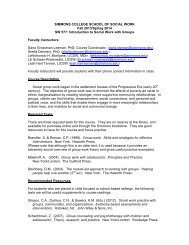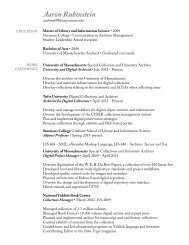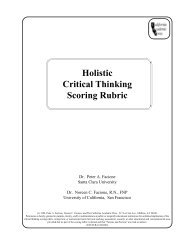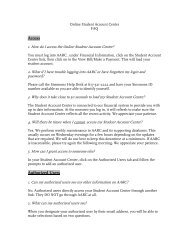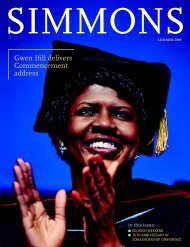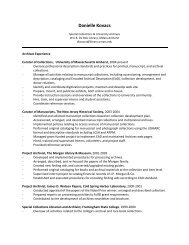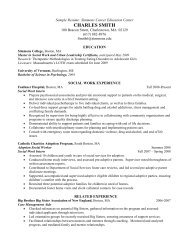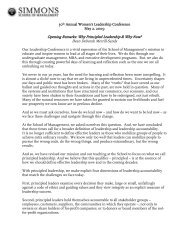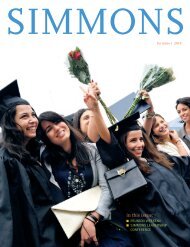Incorporating Emotional Intelligence into the Preparation and ...
Incorporating Emotional Intelligence into the Preparation and ...
Incorporating Emotional Intelligence into the Preparation and ...
You also want an ePaper? Increase the reach of your titles
YUMPU automatically turns print PDFs into web optimized ePapers that Google loves.
Continued/Table 2: Ten Suggestions for Increasing <strong>and</strong> Practicing <strong>Emotional</strong> <strong>Intelligence</strong> duringInternational Travel6. Work to connect with each fellow traveler. Avoid splitting yourself off from <strong>the</strong> group withone or two special friends. This reduces your resources <strong>and</strong> limits your future options while itundermines group process.7. Write a journal. Writing is a tool that can help surface feelings <strong>and</strong> ideas about how tomanage <strong>the</strong>m. Keeping a journal can serve as a practice <strong>and</strong> reminder of <strong>the</strong> physical <strong>and</strong>emotional journey you are taking8. Be wary of <strong>the</strong> results of alcohol consumption. Often traveling adults who don’t know eacho<strong>the</strong>r well socialize with alcohol. When tired, stressed, <strong>and</strong> in unfamiliar surroundings, drinkingmay depress your ability to exercise EI competencies.9. Adopt a Live <strong>and</strong> Let Live philosophy. Your engagement with your fellow travelers, whileintense, is time limited. Try to shrug off o<strong>the</strong>rs’ idiosyncrasies if <strong>the</strong>y don’t overtly intrude onyour experience.10. Schedule a trip de-briefing session before traveling. Everyone should know that <strong>the</strong> groupwill ga<strong>the</strong>r on return to review <strong>the</strong> trip, settle outst<strong>and</strong>ing issues, <strong>and</strong> share improvement ideas for<strong>the</strong> next course. This also gives participants <strong>the</strong> opportunity to self-regulate <strong>and</strong> delay workingout some problems until return. Also assess <strong>the</strong> EI process. How can skills learned by applied indaily life?The Post Travel PeriodIn terms of group development, now is <strong>the</strong> time for adjourning <strong>and</strong> parting. Inasmuch as <strong>the</strong> group hasworked closely toge<strong>the</strong>r under intense conditions, <strong>the</strong>re may be unfinished business in terms ofunresolved conflict. Additionally, <strong>the</strong>re is likely to be some letdown <strong>and</strong> sadness because a remarkableexperience has come to an end. It may be necessary to deliberately seek emotional closure amongparticipants, particularly since new tasks <strong>and</strong> old responsibilities are pulling everyone in differentdirections. Some ideas to promote <strong>the</strong> exercise of EI competencies at this stage include <strong>the</strong> following:For participants.• Exorcise left over emotions by talking to family <strong>and</strong> friends. Use reflection time to betterunderst<strong>and</strong> how <strong>the</strong> practice self-awareness, self-regulation, motivation, empathy, <strong>and</strong> social skillscan boost personal performance.• Meet for <strong>the</strong> previously scheduled debriefing session for <strong>the</strong> purpose of discussing anyproblems, issues, or conflicts unresolved during travel.• Don’t expect to completely resolve all differences of opinion. In wrapping up <strong>the</strong> activities of atemporary group, final resolution on certain conflicts may carry too high a price to be worthwhile.For <strong>the</strong> institution.• Maintain an institutional underst<strong>and</strong>ing of emotional intelligence training for internationaltravelers. Share feedback from students who have used <strong>the</strong> curriculum with administrators <strong>and</strong>professors. Share material with a broad faculty base whe<strong>the</strong>r <strong>the</strong>y are travel leaders or not. (Mostnotably, professors of organizational behavior are likely to be receptive).• Ask all trip leaders to routinely integrate EI training <strong>into</strong> <strong>the</strong>ir course plans. An EI lesson plancould be generically prepared for all faculty responsible for travel courses.• Identify EI experts on your faculty <strong>and</strong>/or staff <strong>and</strong> broadcast <strong>the</strong>ir talents. Extant trip leadersmay not be familiar with EI concepts <strong>and</strong> may need to be trained. If EI work is deemed valuable buttrip leaders are not interested or able to train students, facilitators can be brought <strong>into</strong> <strong>the</strong> class tohelp complete this work pre-travel.<strong>Emotional</strong> <strong>Intelligence</strong> Competency Building for International Travel Course Participants 10



